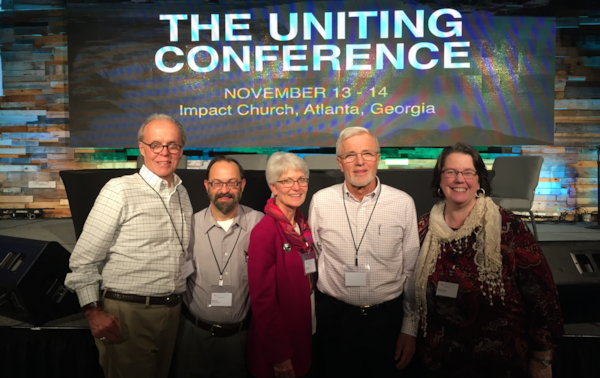The Uniting Methodist Movement held their first conference this week in Atlanta, GA.
JOHN E. HARNISH
Retired pastor, Michigan Area
“Will the center hold?” The “Uniting Methodists” think it will.
Five persons from the Michigan Area took part in a two-day Conference in Atlanta, November 12-13, the first event sponsored by the newly organized Uniting Methodist Movement. In their mission statement, the Movement says they have come together to “give voice to faithful United Methodists and speak up to urge the church not to divide over disagreements about same-sex marriage and ordination of LGBTQ persons.”
The movement seeks to bring together centrists, progressives and traditionalists with the desire to remain as one church. They believe the vast majority of United Methodists want to continue to support the denomination in fulfilling its mission to “make disciples of Jesus Christ for the transformation of the world” and that we should be able to make room for differing convictions of conscience on these issues while still remaining one church. Over 300 persons gathered in Atlanta and an additional 100 participated on-line. Over 4,000 persons have signed their names to the purpose of the Uniting Methodist Movement on their website.
Attendees from the Michigan Area included the Rev. Melanie Carey, the Rev. Joy Barrett, Rob Long, Wayne Bank and the Rev. John E. Harnish. Carey, Barrett and Bank will be delegates to the special General Conference in 2019 which will act on recommendations from the Council of Bishops, based on the work of the Commission on the Way Forward.
The Atlanta event included lectures by Dr. David Field, author of “Bid Our Jarring Conflicts Cease: A Wesleyan Theology and Praxis of Church Unity”. Field, a United Methodist scholar from Switzerland, provided the foundation for the conversation by reflecting on John Wesley’s concept of holiness.
He said for Wesley holiness meant loving God and loving neighbor with our lives oriented and motivated by that love. “For Wesley”, said Field, “holiness includes loving those with whom we disagree. Wesley believed we ought to have a particular love for other Christians and that love becomes the basis for church unity.”
Another speaker, Rev. Jason Wellman from Ohio, suggested that the current debate in the church is “not a matter of the authority of scripture—both sides love the scripture. What we have is a bifurcation of the Gospel. But we need both sides.” Wellman asserted the church “should be the place where we live an alternative narrative to the world around us, where we can hold in tension our diverse convictions.”
When asked about their hope for what would come out of this movement, Rev. Melanie Carey said she hoped this group would be able to “help the General Conference session function in a better way than previous General Conferences—like mature Christians.” Rev. John Harnish sees the Movement as a voice saying, “We can hold the center; we want to be a church that spans our differences.” Quoting one of Wesley’s General Rules, Wayne Bank said his hope is that we will find a way to “do no harm”. Bank admits that his children simply don’t understand the conflict we are in and he hopes we will think of them as we envision the future of the church because we are hurting our own people who have established friendships with the LGBTQ community.
Leaders of the Uniting Methodists admit that the group is somewhat loosely connected, a ground-up movement led primarily by younger clergy who share a vision of the church which is focused on our Wesleyan identity and our shared mission.
For more information on the Uniting Methodists, go to http://unitingmethodists.com and for information on the work of the Commission on the Way Forward and the Council of Bishops, go to http://www.umc.org/who-we-are/commission-on-a-way-forward.
Last Updated on November 2, 2023

